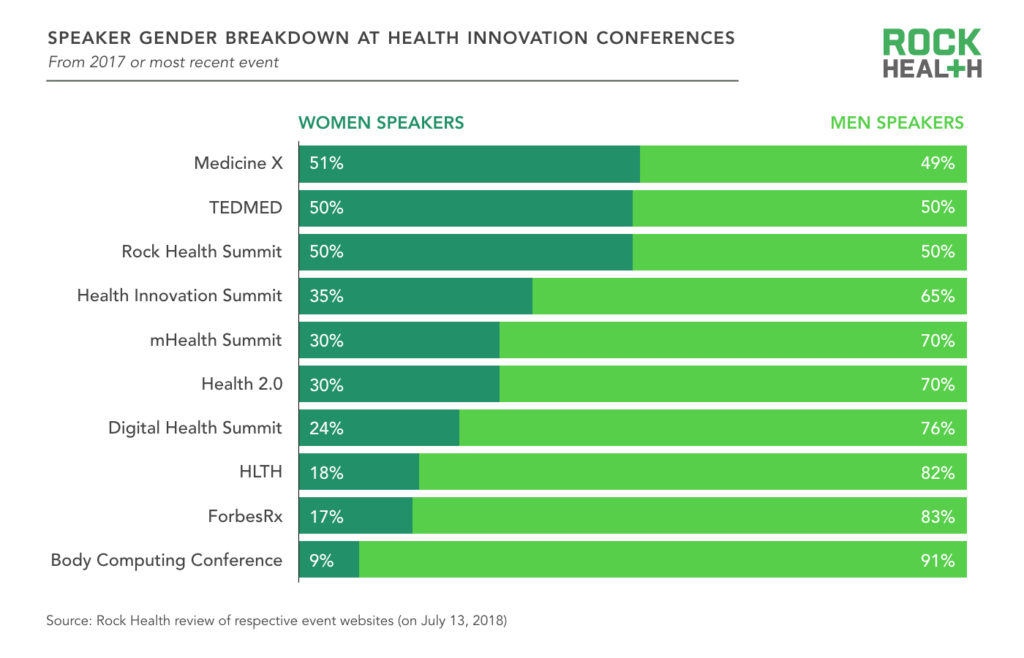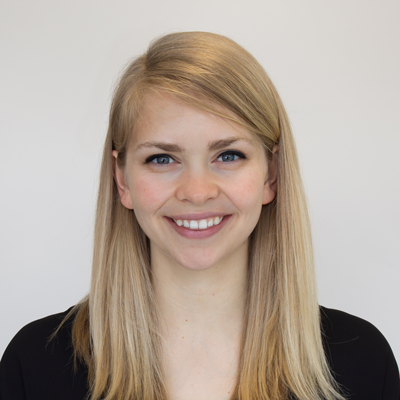How you can set the stage for gender parity at health innovation conferences
In 2013, women’s voices were largely missing from healthcare conferences. By 2014, not much had changed. So we built a public database of leading women speakers to help get more talented women on stage.
Five years later, it’s clear healthcare industry conferences still have a long way to go to achieve inclusion of men and women at industry events. Of the ten healthcare technology conferences we reviewed, only three had equal representation of men and women speakers. We can do better—and we hope conference organizers will join us in committing to create more inclusive (and thus higher quality) conference experiences.

When we commit to the principle of inclusion for Rock Health events—in terms of our audience and speakers—we host better events. We challenge ourselves to find emerging leaders who can share novel insights. And when we do this right, better, more thoughtful conversations emerge because of the diversity of speaker perspectives. In fact, the goal of inclusion and the goal of delivering the best possible conference experience reinforce one another.
Ensuring a diverse mix of speakers and attendees requires intentional effort, but it’s a feasible (and worthy!) ambition we hope every conference organizer will strive for. We’ve tested various tactics over the years to keep ourselves honest as we strive toward greater inclusion and diversity at our events—here’s what works for us (and we encourage you to share resources you’ve found to be helpful in the form below!).
- Think about why gender diversity at your event is important, and discuss it with your entire team. If you begin planning from a place of genuine desire for a gender-balanced event, it will be easier to achieve your goal.
- Create a goal—and stick to it. Make a commitment to the percentage of women voices (or other group) you want on stage and keep track of your progress. If you realize you’re falling short, develop a strategy to broaden your network and identify new, qualified speakers. Creating a diversity policy like that of MassBio (SXSW also explicitly commits to diversity) may also help you achieve your goal by crystallizing your intentions.
- Put in the work to recruit diverse speakers. Comb through LinkedIn and social media, or make a call for speaker submissions. Find up-and-coming leaders who may not have a great deal of speaking experience, but do have a lot to say.
- Check out our updated database of leading women healthcare speakers. Do you know a phenomenal woman who deserves to be in the limelight? Submit her information and we’ll add her to the database.
- Make your event as accessible as possible. Working women with families spend more time on household and childcare tasks than men do, and are more likely to experience “career interruptions.” Make it as easy as possible for all attendees to join in: host your event in a convenient location and during the workday instead of evenings. We’ve even heard of some conferences offering childcare.
- Keep it professional. That means a definite no to booth babes and explicit dancers. Women being objectified in a networking or work environment is uncomfortable for everyone.
- Keep others accountable. Were you asked to speak at a conference? Inquire whether there are women speakers on your panel—and if not, provide recommendations for stellar, qualified professionals. Together, we can say goodbye to the “manel.”
- Use your voice. As a conference attendee, you matter just as much as the high-profile speaker lineup. Ask event organizers how they are ensuring balanced representation at the event. Attend conferences with a demonstrated commitment to putting diverse voices on stage—and consider passing on those without.
Putting these tactics to work, we recently hosted the Enterprise Insights Forum, a day for leaders from enterprise healthcare companies to connect with select investors, academics, and startup founders. While this year’s topic—AI and machine learning (AI/ML) in healthcare—tends to be a male-dominated field at the leadership levels, 50%* of our of speaker lineup was composed of women experts. By challenging ourselves to find emerging and untapped voices, we put ourselves in a better position to host a fresh, relevant, and inspiring event where all attendees feel welcome and connected to the community.
Our events are by no means perfect and we want to hear from you about how we—and other conference organizers—can do better. Please submit your thoughts via the form below.
*Due to a last minute cancellation, one woman speaker was unable to attend the day-of event.

